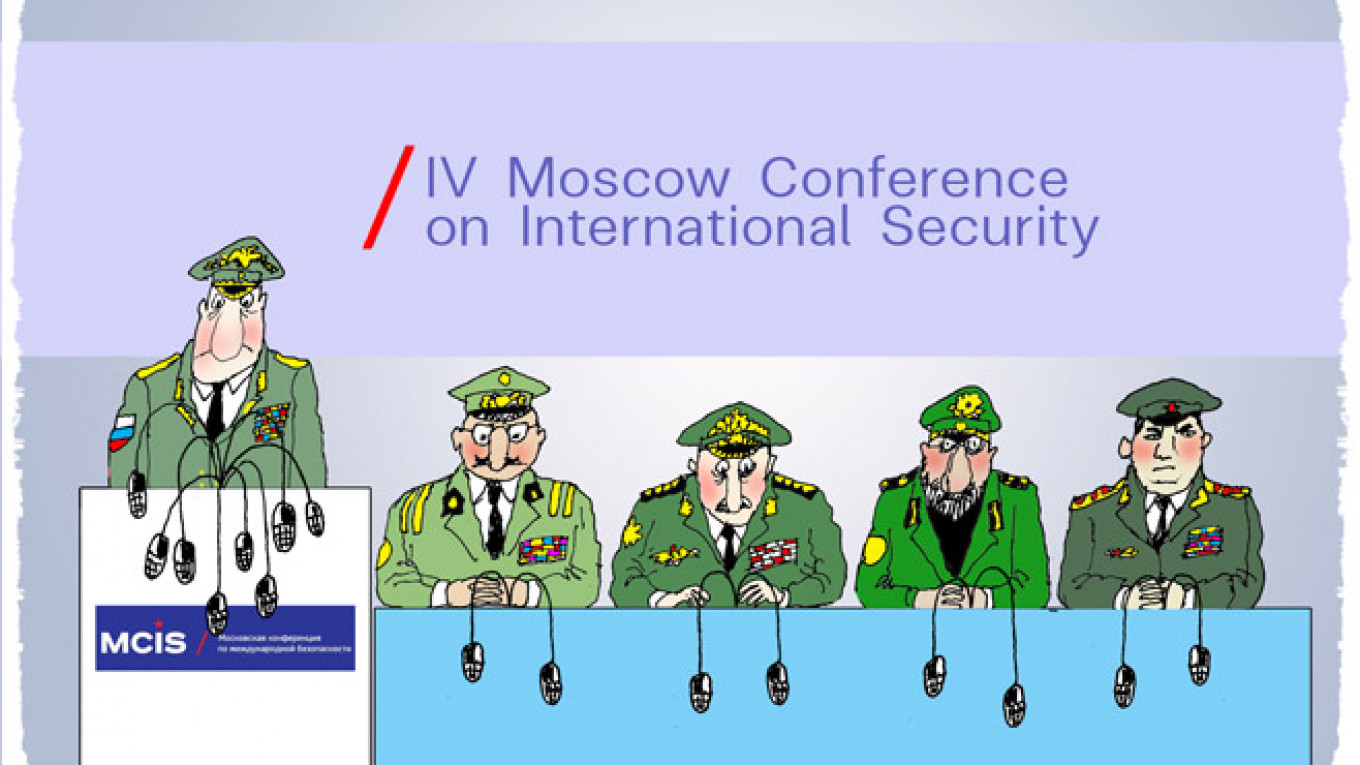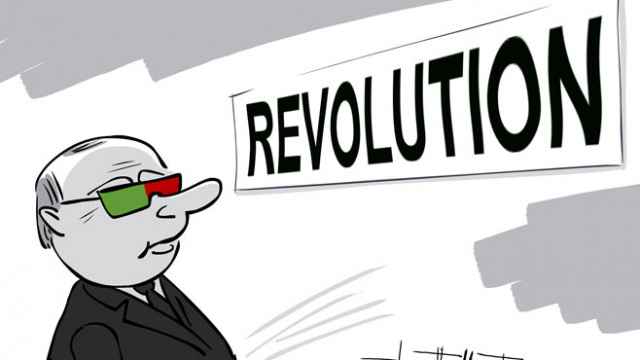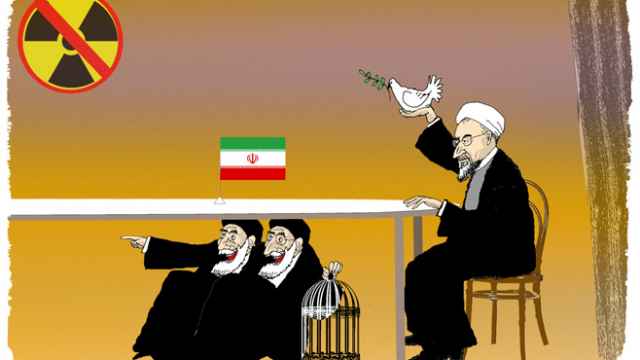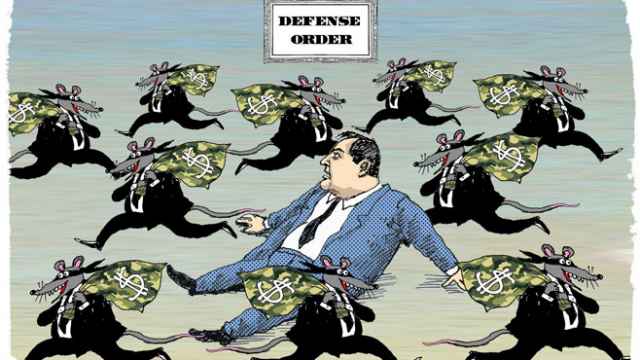Once again, our national leader Vladimir Putin has personally ensured the defense and security of Russia. However, first things first. When I initially learned that the so-called "international conference" that the Defense Ministry had taken months to prepare would fall on the same date as Putin's live call-in television show with the Russian people, I even felt some sympathy for military commanders. It was obvious that the call-in show would completely eclipse the military conference.
I could only guess as to the reason for the scheduling snafu. Had the authorities lost all ability to plan properly, or was it an attempt by Defense Minister Sergei Shoigu to show everyone how highly he ranks in Putin's power vertical?
Now I know the real reason. Putin heroically used his show to divert the attention of the international media away from the military conference, thereby sparing Russia's top brass the humiliation they would have inevitably suffered if outside observers had made even the most superficial analysis of their speeches at that gathering.
Although Russia's military chiefs last year managed to conjure up the remarkable new theory that "color revolutions" are a new form of military action, this year the Defense Ministry proved unable to produce a comparable masterpiece of creativity.
This time, the speeches by Defense Minister Shoigu, General Staff Chief Valery Gerasimov and General Staff Deputy Chief Andrei Kartapolov were an endless rehashing of the same old ideas.
They argued that Russia acted within the law when it annexed Crimea because the majority of the peninsula's residents voted in favor of the move. Of course, they made no mention of the fact that dozens of local deputies voted to hold the referendum only after Russian troops — the so-called "polite men in green" — had seized Crimea's parliament building.
Russia's military chiefs gave vent to a chorus of complaints over the fact that the United States and NATO have greatly reinforced their military presence near Russia's border by dramatically increasing the number of military maneuvers and deploying additional troops to the area.
At the same time, Russian generals diligently pretended that they saw no direct connection between the "aggressive" actions of the West and Russia's annexation of Crimea, as well as the hybrid war it has been stoking in southern and eastern Ukraine.
They also continued to accuse the United States of wanting to create a missile defense system that only at some future date might threaten Russian strategic missiles. All of these arguments, whether true or not, would only make sense if they were intended as the starting point of bilateral discussions.
The problem, however, was that in contrast to the previous three such international military conferences, Western officials simply ignored this event. It was therefore unclear to whom Russian generals were addressing their angry remarks.
What's more, they said nothing new this time. The one exception was General Gerasimov, who hinted at the possibility of a direct military confrontation with Ukraine. "We do not know what instructions the Ukrainian authorities are receiving from their Western 'handlers' and where Kiev might direct its aggression in the future," he said. "But in any case, that uncertainty does not exclude a military threat to Russia."
But these hints and allusions were not enough to give the conference a sense of purpose. And so, by default, the attention shifted to some of the more "interesting" states present. For example, North Korean Defense Minister Hyon Yong Chol exclaimed: "We will not beg for peace and will not tolerate abuses by the U.S. and its minions. We will decisively respond to any attack — whether it is a war of conventional weapons or nuclear forces — and will rally even closer around Comrade Kim Jong Un," he said.
Disregard for a moment the ritual glorification of the North Korean dictator and ask yourself whether that statement fundamentally differs from these words spoken by the head of Russia's General Staff: "In its efforts to 'put Russia back on its knees,' the intention of the U.S. and its NATO partners to create a crisis situation in Russia's border regions becomes increasingly clear. … The state is not unprepared to respond appropriately to the security challenges now facing it. The measures now being taken in this regard enable it to reliably protect Russia's interests," Gerasimov said.
But the real star of the conference was the defense minister of Iran — the country that Russia only days ago promised to sell S-300 missile defense systems. The Iranian Minister quickly responded: "I would like to support the idea of developing multilateral cooperation on defense between China, Iran, Russia and India to counter the deliberate movement to expand NATO eastward and the deployment of a missile shield in Europe."
Frankly, nobody but the Iranian general made any mention of such a bold proposal. I honestly doubt that China and India are ready for such "multilateral cooperation on defense." What the Iranian minister proposed is essentially a military alliance with Moscow, a move that would turn Russia into the main rogue state on the planet.
As one Gazeta.ru military expert with close ties to Russia's top brass recently wrote, "Russia is now in a state of strategic isolation and is trying to establish contact with anyone it can in an attempt to show that is not, in fact, isolated."
However, this Defense Ministry conference only demonstrated that "strategic isolation" coupled with the willingness to team up with whatever allies are at hand only indicates a condition of intellectual and moral poverty.
Alexander Golts is deputy editor of the online newspaper Yezhednevny Zhurnal.
A Message from The Moscow Times:
Dear readers,
We are facing unprecedented challenges. Russia's Prosecutor General's Office has designated The Moscow Times as an "undesirable" organization, criminalizing our work and putting our staff at risk of prosecution. This follows our earlier unjust labeling as a "foreign agent."
These actions are direct attempts to silence independent journalism in Russia. The authorities claim our work "discredits the decisions of the Russian leadership." We see things differently: we strive to provide accurate, unbiased reporting on Russia.
We, the journalists of The Moscow Times, refuse to be silenced. But to continue our work, we need your help.
Your support, no matter how small, makes a world of difference. If you can, please support us monthly starting from just $2. It's quick to set up, and every contribution makes a significant impact.
By supporting The Moscow Times, you're defending open, independent journalism in the face of repression. Thank you for standing with us.
Remind me later.







